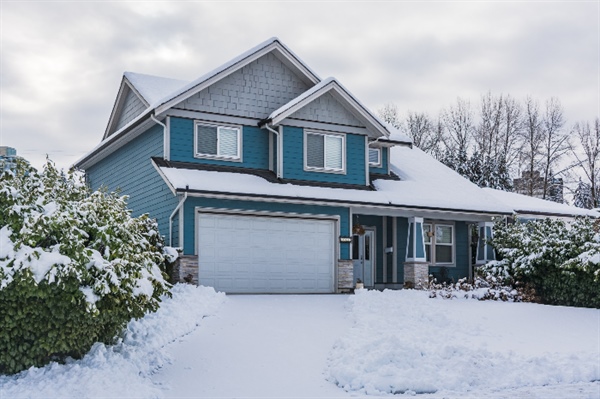Best Roofing Materials for Harsh Winters: A Guide for Homeowners

Harsh winters bring snow, ice, and fluctuating temperatures that can put even the most durable roofing materials to the test.
For homeowners in regions prone to severe weather, choosing the right roofing material is essential to ensure the longevity and safety of their homes. Factors like resistance to heavy snowfall, ability to withstand ice buildup, and performance during freezing temperatures are critical in selecting the best option for winter-ready roofing.
This article will explore key aspects of winter roofing by addressing questions such as which materials perform best against ice and snow, how temperature fluctuations impact various roofing types, and the benefits of low-maintenance solutions. Read on to make informed decisions and safeguard your home with the right roofing material for the winter months.
Which Materials Handle Ice & Snow Best?
Durability and shedding capabilities are critical when selecting roofing materials for regions with heavy snow and ice.
Metal roofing is widely regarded as one of the best options for handling snow due to its smooth surface, which encourages snow to slide off rather than accumulate. Metal roofs are also highly resistant to ice dams, reducing the risk of leaks caused by melting and refreezing water.
Asphalt shingles, a popular roofing choice, perform well when reinforced with ice and water shields during installation. These materials can resist water infiltration from ice dams while providing adequate insulation. Cedar shake roofs, while visually appealing, require proper maintenance to handle snow effectively and avoid moisture damage.
Investing in materials that combine water resistance and durability, such as synthetic shingles or slate, can be beneficial for areas with extreme winters. Their natural strength and weatherproofing properties ensure long-lasting performance during harsh winters.
How Do Different Roofing Materials Respond to Temperature Fluctuations?
Temperature fluctuations can cause roofing materials to expand and contract, leading to potential wear and damage over time.
Metal roofs handle these changes well due to their flexibility and strength, which prevent cracking or warping. Their reflective surface also helps manage temperature shifts, reducing heat absorption during sunny winter days.
Although asphalt shingles are durable, they may become brittle in extremely cold conditions, making them susceptible to cracking. However, modern advancements in asphalt shingle technology have improved their flexibility and resistance to thermal stress.
Cedar shake roofs, while natural and insulating, may warp over time if not installed with sufficient allowances for temperature-induced expansion.
Synthetic materials like rubber or composite shingles offer enhanced elasticity, allowing them to adjust seamlessly to temperature variations.
Choosing materials designed for durability in fluctuating climates ensures your roof maintains its integrity throughout the winter.
What Roofing Materials Require the Least Maintenance in Winter?
Low-maintenance roofing is essential for homeowners who want to minimize winter upkeep. Metal roofs are a top choice because they shed snow naturally and resist ice buildup, reducing the need for frequent snow removal or repairs. They also withstand harsh conditions without significant wear.
Synthetic shingles, made from rubber or polymer-based materials, are another excellent option. They mimic the appearance of natural materials like slate or wood while requiring minimal maintenance. Their cracking and water damage resistance ensures they remain intact even in freezing temperatures.
Asphalt shingles, when paired with proper insulation and ventilation, can also provide a low-maintenance winter solution. Their affordability and durability make them a practical choice for many homeowners.
Regular inspections can help ensure they remain in optimal condition without requiring extensive repairs.
Are Metal Roofs Better Suited for Snowy Climates?
Due to their unique properties, metal roofs are highly effective in snowy climates. Their smooth, non-porous surface allows snow to slide off easily, preventing excessive weight accumulation that could damage the roof structure. This self-shedding capability minimizes the risk of ice dams, a common issue in winter.
Another advantage of metal roofs is their exceptional durability. They resist corrosion, cracking, and other weather-related damage, ensuring a long lifespan even in extreme conditions.
They can also support heavy snow loads without compromising their structural integrity, making them a reliable choice for winter protection.
The energy efficiency of metal roofs also plays a significant role in homes in snowy regions. By reflecting sunlight, they prevent heat loss and reduce energy costs during cold months. These features make metal roofing a preferred option for homeowners looking to enhance their winter readiness.
How Does Insulation Factor in Material Selection?
Insulation is a key factor when choosing roofing materials for winter climates. Proper insulation prevents heat loss, reduces energy costs, and minimizes the formation of ice dams.
When installed with adequate underlayment and insulation, metal roofs provide superior thermal performance and help maintain consistent indoor temperatures.
Asphalt shingles can also benefit from enhanced insulation systems, particularly when combined with well-ventilated attic spaces. This reduces the risk of moisture buildup and ensures the roofing materials remain in good condition.
Cedar shake roofs naturally offer insulating properties but require professional installation to optimize their performance.
Synthetic materials, such as composite shingles, often come with built-in insulating features. These options provide additional protection against temperature extremes, making them suitable for winter environments.
Pudas Construction Helps You Prepare for Harsh Winters
Choosing the best roofing material for harsh winters is crucial to safeguarding your home from the challenges posed by snow, ice, and fluctuating temperatures. At Pudas Construction, we specialize in providing tailored roofing solutions designed to withstand extreme winter conditions.
Our expertise spans a variety of roofing materials, from durable metal roofs to low-maintenance synthetic shingles, ensuring you have the perfect fit for your home.
Contact us today to explore our winter-ready roofing options and schedule a consultation with our experts. You can reach us at 612-481-3053 or on our Get a Free Estimate page. Let Pudas Construction give you the confidence and peace of mind for the upcoming winter season!